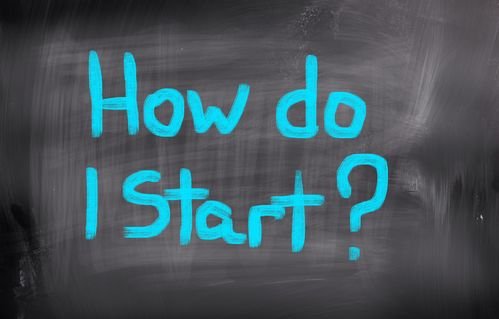I was part of a conversation recently with someone wanting to start a business without so much as a name for the business, let alone any imagery or marketing materials. She wanted to just skip all that and get out there selling her brokering services.

(Photo from Depositphotos catalog)
Now some of that you actually can wait on.
You don't absolutely need a website before you start, for example. It helps, because one of the first things someone does before hiring a new service provider is often to look up their website to get a feel for their professionalism and find out more about them. Having at least a domain name, if not a site up at the domain name, offers the possibility of an email address that is [email protected]. Trying to do business with a yahoo account, or even gmail, is not going to inspire confidence in potential clients.
Remember also that this is a new business we're talking about. That means that you have no long list of testimonials or reviews from satisfied former clients to establish that you can and will do what you say you will. You have to present yourself with that much more professionalism to overcome the natural doubt in the situation.
So can you start a business without knowing the name of the company, not being able to buy a domain name that relates to the company name, not being able to have an email address on a company domain?
Yes, you can. Should you though? I think not.
I would put on the minimal startup list knowing the name of your company and getting an email address that matches it. This is a non-negotiable in my book.
What You Don't Need Right Away
Here are some optional items:
- A CRM - useful to organize many conversations with many contacts, but when you only have a handful of people willing to talk to you about what you offer, you will probably remember them well enough when you see their name in your inbox or on your phone. Get this as soon as you start forgetting the details of conversations you had with an existing or potential client, or when you start having someone help you with accounts.
- Business cards - a lot of people are skipping these permanently these days. You can just put info into each other's phones
- Office space - depending on what you do this may be an unnecessary expense. If you need customers to walk in, then you need a central location and professional work environment. If you can go to them or work remotely, you're better off working from home until you can comfortably afford the rent out of cash flow.
- A full website - you could just have a single page site that says a little about you and has a contact us form, then build out the full website as you become more familiar with what things about you the customers care most about. The more experience you have with happy customers, the easier it is to write marketing to attract new ones. And a website is a marketing tool.
- A logo - there are people who even create a website without one of these. It can be an important part of branding to have a logo that graphically depicts the idea you want to convey about your business. A picture is worth 1000 words, as they say. But don't get hung up on this. Again, the more work you do, the more clarity you'll have about what your people are best responding to. Play to what's working instead of investing yourself too heavily before you know what's going to connect with your audience.
There are other things you can wait on, like hiring staff usually, or even outsourcing things like bookkeeping that you can learn to do in software like Xero for a simple services business with no inventory. But these are the things I find people often get themselves tripped up thinking they need out of the gates. They overwhelm themselves with too many new things to try to learn and manage, and weigh themselves down with too many expenses before they are profitable.
Can you think of anything else that tends to be either put off too long or acted on too quickly when new entrepreneurs are first starting out?
Please share in the comments what you've learned about minimal startup requirements.
Creating a path to a minimum viable product (MVP) and first sales is key. Anything that doesn't help you get to those 2 milestones can be put off.
Agreed. You have to stay focused on only those things that are needed to get sales and start getting that black and white feedback from the market. Will they pay for this idea or not? That's where you have to focus at first.
Great article. I like coz I also have a post on a similar topic https://steemit.com/business/@marihuya/tips-for-starting-a-small-business